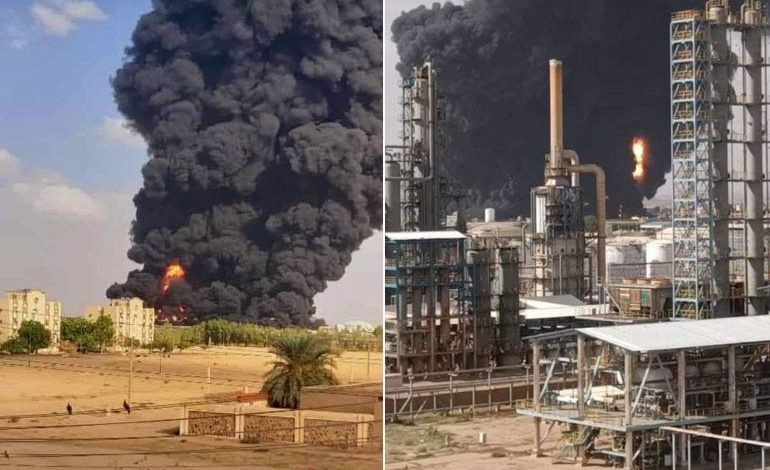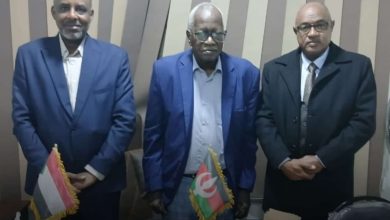
On Thursday morning, the rebel Rapid Support Forces (RSF) militia set fire to and destroyed the Khartoum refinery in Al-Jaili, adding to its series of systematic crimes aimed at destroying vital infrastructure in Sudan. Experts estimate the refinery’s current value to be around $7 billion.
Army Statement:
The Sudanese Armed Forces stated that the RSF militia, continuing its hateful criminal behavior against the country and its people, resorted to burning the Khartoum refinery in Al-Jaili on Thursday morning. This desperate attempt to destroy Sudan’s infrastructure comes after their failure to achieve their ambitions of seizing the country’s resources and land.
The army’s statement said, “This malicious act reveals the extent of the criminality and depravity of this militia, both its leadership and members, and their allies. It underscores their involvement in unprecedented crimes and violations during wartime against Sudanese citizens and their properties. This strengthens our resolve to pursue them everywhere, cleansing every inch of the country from their presence. By God’s will, we will then focus on rebuilding everything their sinful hands have destroyed.”
Government Response:
Minister of Culture and Information and official government spokesman, Khalid Al-Eisaer, stated that the burning of the Khartoum refinery in Al-Jaili and the targeting of other vital facilities and civilian homes would not deter the government from continuing its efforts to eradicate this rogue faction from Sudan.
He added, “The government affirms that such crimes committed by the militia constitute a blatant violation of international humanitarian law and the Geneva Conventions concerning vital facilities.”
The minister further explained that this act is a continuation of the systematic criminal practices aimed at destroying vital infrastructure in Sudan, including prior attacks on water and electricity stations, dams, hospitals, residential homes, government institutions, museums, schools, and universities.
Foreign Ministry: A Heinous Crime
The Sudanese Ministry of Foreign Affairs called on the international community to condemn the militia’s actions in burning the Al-Jaili refinery.
In its statement, the ministry said, “The Janjaweed militia continues its aggressive war on Sudan’s people, state, national institutions, and infrastructure, exploiting the leniency of Western powers and the United Nations towards it and its regional backers. This heinous crime of burning the Khartoum refinery this morning comes after the militia realized it could not hold its ground amid the army’s tightening siege.”
The statement continued, “We urge all members of the international community to take a moral stance by condemning this heinous crime and punishing the terrorist militia and its supporters.”
The ministry emphasized that this atrocity is another nail in the coffin of the criminal militia following its successive military, political, and moral defeats. The Sudanese people, who have demonstrated remarkable resilience, are capable of recovering from all losses incurred during this war imposed upon them.
The statement also labeled the act as a war crime and a form of terrorism, emphasizing that the militia’s systematic targeting of key development pillars and essential services has included attacks on power stations, water facilities, bridges, and factories.
Details About the Refinery:
The Khartoum refinery, located in Al-Jaili, about 70 kilometers north of Khartoum Bahri, was established in 1997 and began operations in 2000. It is one of Sudan’s most vital oil facilities and the largest refinery in the country. Surplus production is exported through the Bashayer Port on the Red Sea, a 1,610-kilometer pipeline.
The refinery was linked to oil fields in West and South Kordofan states and covered 60% of Sudan’s gasoline needs, 48% of diesel, and 50% of cooking gas. Under normal circumstances, it produced around 10,000 tons of diesel, 4,500 tons of gasoline, and 800,000 tons of cooking gas daily.
Operating below its maximum capacity of 100,000 barrels per day, the refinery provided 45% of the country’s fuel needs, which are critical for agriculture, industry, electricity generation, transportation, and bakeries. It also supplied the adjacent petrochemical factory with petroleum gases for the production of plastic raw materials.
Sources estimate the refinery’s current value to be no less than $7 billion. Initially, its construction cost was around $1 billion, with the first phase costing $650 million for a capacity of 100,000 barrels per day. The second phase, with a capacity of 50,000 barrels per day, cost $350 million.



